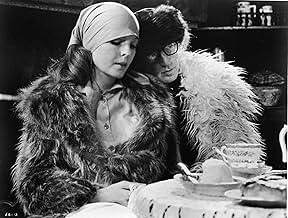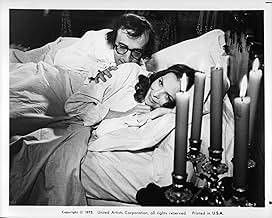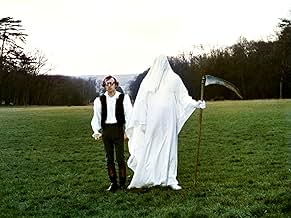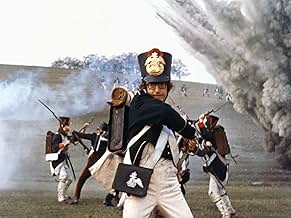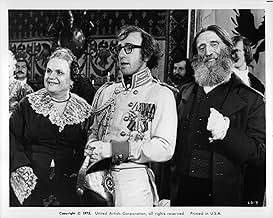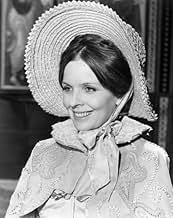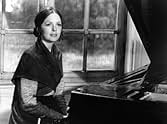Im zaristischen Russland schmieden ein neurotischer Soldat und sein entfernter Cousin ein Komplott zur Ermordung Napoleons.Im zaristischen Russland schmieden ein neurotischer Soldat und sein entfernter Cousin ein Komplott zur Ermordung Napoleons.Im zaristischen Russland schmieden ein neurotischer Soldat und sein entfernter Cousin ein Komplott zur Ermordung Napoleons.
- Auszeichnungen
- 1 Gewinn & 1 Nominierung insgesamt
- Mikhail
- (as Feodor Atkine)
- Rimsky
- (as Yves Barsaco)
- Servant
- (as Gerard Buhr)
- Ivan
- (as Henry Czarniak)
Empfohlene Bewertungen
The film is full of philosophical and pseudo-philosophical commentary. In one instance, a priest suggests that Spinoza proves God's existence. Boris and Sonja banter back and forth about epistemology and such, and only once does Sonja really offer any advice worth taking in: that "to love is to suffer and to not know love is to suffer", which really amounts to little more than "life is suffering", something the Buddhists or Schopenhauer would have embraced.
But then again, you have wise men spouting off silliness, including the view that German Jews have stripes, and Russian Jews have horns. We are left to conclude, as Boris quickly does, that being logical in an illogical world is a complex and unfavorable situation.
It has been said that the use of Sergei Prokofiev for the soundtrack adds to the Russian flavor of the film. Other parts referencing Russian culture include a dialogue between Boris and his father with each line alluding to or being composed entirely of Dostoevsky titles. This is crucial to really get the point of how backwards everything was across.
I was not able to fully appreciate the film because I am ignorant of its references to the works of Bergman (notably "Persona" and "Smiles of a Summer Night"). But that is true of much of Allen's work, I think. His constant references to Dostoevsky did reach me but may have been missed by others. Yet, even if few completely "get" the picture, it remains beautiful and humorous just the same. Allen has called this his favorite picture, even more so than "Annie Hall". I have to see more to be sure, but as of now I am inclined to agree.
Amusing picture fable is plenty of the filmmaker's signature angst-ridden philosophical comedy . Hilarity slips into vulgarity rather too often in this usually in-and-out early Woody Allen comedy which embroils the little man in Russia invaded by Napoleon . Like a Russian soldier , the gags and funny sketches fire off in all directions . There is a lot of spoofs and even Bergman's ¨The seventh seal¨ and ¨Persona¨ and jokes for moviegoers . As the movie featured the Death character of The Grim Reaper , Allen is known to be inspired and influenced by Swedish filmmaker Ingmar Bergman who had featured the Grim Reaper in his film The seventh seal (1957) ; in the Bergman film the Grim Reaper wears black robes whereas in this film he wears a white gown . The picture is ironical about major Russian novels particularly the works of Leo Tolstoy and Fyodor Dostoevsky . In fact , the movie title is a play on words of such Russian novel titles as Leo Tolstoy's "War and Peace" and Fyodor Dostoevsky's "Crime and Punishment" . Nice acting by Woody Allen at his best , as a condemned man who reviews the follies of his life . His comic style paid homage to a number of classic comedians which included Bob Hope , Charles Chaplin and The Marx Brothers . Intermittently hilarious , pre-Annie Hall Allen fare , it is is one of eight cinema movie collaborations of Woody Allen and actress Diane Keaton, Allen co-starring in six of them and directing seven of them . These are the followings : Play It Again Sam , Sleeper , Interiors , Manhattan , Radio Days , and Manhattan Murder Mystery . It is fun enough to make wish there were more of it and you will have to keep your eyes peeled to spot notorious secondaries as Jessica Harper , Harold Gould , Olga Georges Picot , Féodor Atkine , Gérard Buhr , Howard Vernon and James Tolkan as Napoleón and his double and about ¨fifty-four supporting players" .
Witty as well as classical musical score contributes much . At the beginning the soundtrack was taken from Igor Stravinsky music , but , subsequently , Woody Allen took Sergei Prokofiev's lighthearted score that worked far better . The movie's big battle sequence features Sergei Prokofiev's cantata music from Sergei M. Eisenstein's epic Alexánder Nevsky (1938). Colorful as well as evocative cinematography by Ghislain Cloquet , being shot on location in Hungary and Paris , France . Lavish and stunningly produced by Charles H. Joffe , Allen's ordinary producer . This enjoyable motion picture was vigorously directed by Woody Allen , being his sixth film as director and here to ridicule Russian novels such as "The Idiot", "The Gambler", "War and Peace", "Anna Karenina", "Crime and Punishment", and "The Brothers Karamazov". Woody Allen has said that this movie was "my funniest picture to that time".
That said, it is accessible to just about anybody. Almost nobody does fish-out-of-water comedy as well as Woody Allen (see also "Bananas" and "Sleeper"), and Diane Keaton shines as usual as the promiscuous object of his desire. And look for Jessica Harper in a small role as the cousin who rattles off a convoluted list of romantic entanglements worthy of Chekhov.
This was the last step of Allen's formative period. After this, his films would get a lot more focused.
Indeed, "Love and Death" is not only an homage to literature, but also to early screen comics. There's even a scene where the sound goes out for some silent slapstick, and the fourth-wall-breaking absurdity of the whole thing seems to be especially indebted to the Marx Brothers. As for the Russian connection, though, there are extended mock-philosophical discussions, angst over the existence of God, somber soliloquies, multiple suitors and lovers for everyone, subplots upon subplots and periphery character galore, a lot to do with class and nationality, and... wheat, I guess. (I love that in a blog post from Alistair Ian Blyth that one of my favorite films of the 1910s, "After Death" (1915), which is based on the prose of Ivan Turgenev, is brought up to help explain the supposed importance of wheat in Russian literature.)
Some of the Dostoevsky references are obvious. Allen has a conversation in a jail cell that entirely exists of characters and titles from his stories, including some gossip about a local named "Raskolnikov" who murdered two women. Additionally, Diane Keaton's character is named "Sonja," the hooker with a heart of gold who instigates Raskolnikov's regeneration in the book. "Love and Death" offers the best character summary of Sonja, though, from her own lips: "I'm half saint, half wh-re" (IMDb censorship, you know). And, naturally, Allen plays the atheistic foil to her pious promise land. Best of all, however, is how the connection with Napoleon between "War and Peace" and "Crime and Punishment" is exploited in this film with two other words surrounding the conjunction. Sonja decides that she and Allen's Boris should kill Napoleon for the benefit of humanity, which is akin to the rationale of Raskolnikov for murdering the pawnbroker. Ironically, Napoleon was also his role model for this "extraordinary" act. Boris mixes up the roles further by comparing himself to an insect, which is what Raskolnikov said of the pawnbroker, and claiming Napoleon as a great man. Looking at the parodic adaptation this way gives one as much whiplash as Allen and Keaton's philosophical repartee. To top it off, there are two Napoleons.
There are some allusions to non-comedic films here, too. The ones to "Battleship Potemkin" (1925) and "Persona" (1966) seemed most conspicuous to me. Although "Love and Death" is a lightweight affair, and the jokes are hit and miss, it rewards those who've seen and read what it parodies. And, admittedly, Russian novels such as "Crime and Punishment" were just asking for this sort of loving pillory.
Wusstest du schon
- WissenswertesIn an interview with 'Esquire' magazine, Woody Allen once said of the making of this movie: "When good weather was needed, it rained. When rain was needed, it was sunny. The cameraman was Belgian, his crew French. The underlings were Hungarian, the extras were Russian. I speak only English - and not really that well. Each shot was chaos. By the time my directions were translated, what should have been a battle scene ended up as a dance marathon. In scenes where Keaton and I were supposed to stroll as lovers, Budapest suffered its worst weather in twenty-five years".
- PatzerThe young Boris has blue eyes, but the adult Boris has brown eyes.
- Zitate
Sonja: To love is to suffer. To avoid suffering one must not love. But then one suffers from not loving. Therefore, to love is to suffer; not to love is to suffer; to suffer is to suffer. To be happy is to love. To be happy, then, is to suffer, but suffering makes one unhappy. Therefore, to be unhappy, one must love or love to suffer or suffer from too much happiness. I hope you're getting this down.
- Crazy CreditsRussian composer Sergei Prokofiev is listed in the credits as "S. Prokofiev," just the way he would have been listed in the credits of a Russian film.
- Alternative VersionenThe MGM DVD release deletes the pre-title Prokofiev overture.
- VerbindungenFeatured in V.I.P.-Schaukel: Folge #7.3 (1977)
Top-Auswahl
Details
Box Office
- Budget
- 3.000.000 $ (geschätzt)
- Bruttoertrag in den USA und Kanada
- 20.123.742 $
- Weltweiter Bruttoertrag
- 20.123.742 $


